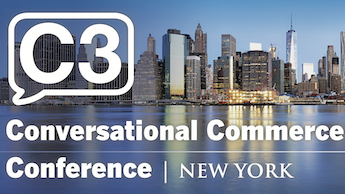 Last week, Opus Research concluded the 2019 Conversational Commerce Conference (#C32019). We brought together participants from industry-leadings solutions providers and prominent brands and enterprise who are finding new ways for consumers to engage with businesses.
Last week, Opus Research concluded the 2019 Conversational Commerce Conference (#C32019). We brought together participants from industry-leadings solutions providers and prominent brands and enterprise who are finding new ways for consumers to engage with businesses.
Presenters and attendees represented enterprises from many of the sectors including in the Intelligent Assistant and Bot Landscape. Uniphore, Nuance, Inference Solutions, Concentrix, Marchex, Invoca, ID R&D, and even Google, showcased how their solutions are helping companies save money, create revenue, and improve customer experiences by significantly changing the way customers interact with those brands. Brands such as Citizens Bank, TD Ameritrade, Travelers and Fannie Mae, described how conversational technologies help build their topline growth.
Highlighted at C3 2019, here are some of the key results achieved by brands using Conversational Commerce:
- Citizens Bank: 115% increase in virtual assistance sales conversion, 10X increase in supported services, 120% increase in virtual assistance usage and 86%+ top 2 box in CSAT scores
- DSW Shoes: Reduced Agent Handle Time (AHT) by 2 minutes resulting in $1.5 million in annual savings, all while improving CSAT Score by 30%
- Eaglemoss: 4X jump in ROI, 10% improvement in cart recovery rates
It may be worth noting that all these companies who implemented NLP and conversational technologies went through their own phase of deliberations and hesitations internally. Some of the questions they pondered included:
- How can Conversational AI help improve topline growth?
- Will Conversational AI significantly improve my bottom line, more than it costs to implement it?
- Are there hidden costs to implementing Conversational AI – such as organizational bureaucracy and change management?
- Will I need to retrain existing contact center agents, or hire new ones?
- Do we want to hand off our customer experience to a machine?
While all these concerns were valid from a business standpoint, the case to adopting Conversational AI was compelling enough for these companies. And the results from those implementations were very encouraging.
Many companies do realize that consumers today live on their mobile phones and may not prefer to engage by voice. Barriers to voice interactions include its synchronous style of communication, where customer might not want to wait for an agent to help them, or go through myriad, complicated IVR workflows only to be dropped from the call and then most likely having to repeat their problem to a “human agent.”
While the 2019 Conversational Commerce Conference showcased mature, successful implementations of enterprise-scale intelligent assistants, many companies realize it is not necessary a product one buys off the shelf. Rather these are systems that require nurturing and training so that it understands the organizational needs better and improves over time. And, frankly, that’s the nature of AI, ML and NLP technologies: It LEARNS from what you GIVE.
At Opus Research, we believe Conversational AI is set to drastically shift how commerce is done. Companies are well on their way to adopting these technologies and creating significant business value.
Categories: Conversational Intelligence, Intelligent Assistants, Intelligent Authentication, Articles

 Getting It Right: What AI Agents Actually Mean for Customer Support (Webinar)
Getting It Right: What AI Agents Actually Mean for Customer Support (Webinar)  Beyond the Basics: How AI Is Transforming B2B Sales at TP
Beyond the Basics: How AI Is Transforming B2B Sales at TP  Voice AI Agents Redefine CX: Trends, ROI, and Strategies for 2025
Voice AI Agents Redefine CX: Trends, ROI, and Strategies for 2025  Why Voice AI Is Foundational for Enterprise Innovation (Webinar)
Why Voice AI Is Foundational for Enterprise Innovation (Webinar)